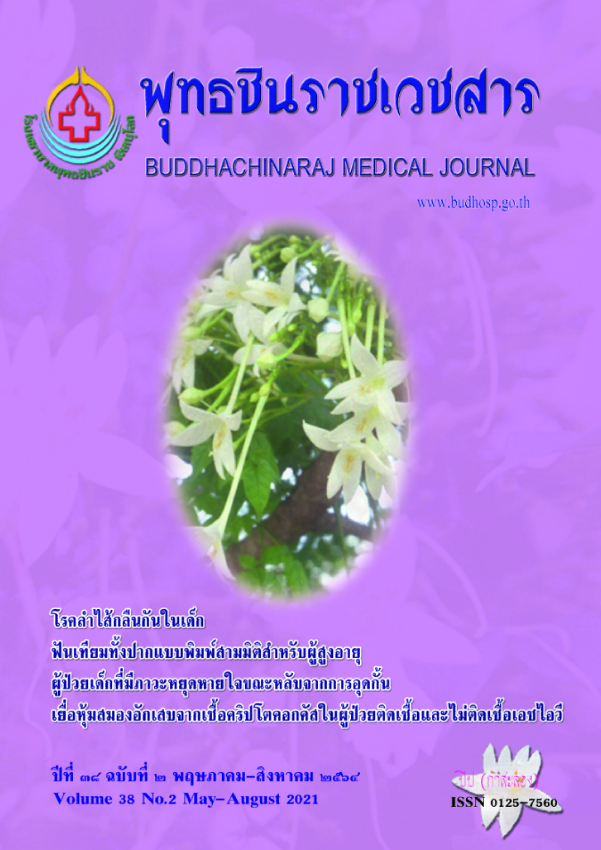Factors Related to Blood Pressure Control Behavior in Hypertensive Patients
Blood Pressure Control in Hypertensive Patients
Keywords:
factors, blood pressure control, behavior, hypertensionAbstract
Hypertension is a chronic disease with an increasing number of patients. If blood pressure levels are not controlled for long periods of time, complications can lead to disability and death. The purpose of this survey was to assess the factors associated with blood pressure control in hypertensive patients at Ban Rai hospital, Uthai Thani Province. The 151 hypertensive patients were asked to answer a questionnaire consisting of age, education level, family income, body mass index, duration of disease, awareness of hypertension disease, perceive of family support, self-efficacy and behavior of controlling blood pressure. The data was presented by number, percentage, mean, standard deviation and the Spearman correlation coefficient. The results showed that education level was positively correlated with blood pressure control behavior (r = 0.179, p = 0.028) and family income was negatively correlated with patients' blood pressure control behaviors (r = -0.171, p = 0.036). Disease perception and self-efficacy were positively correlated with blood pressure control behaviors (r = 0.355, p < 0.001 and r = 0.298, p < 0.001, respectively). Therefore, knowledge should be promoted in groups with low educational levels. There should have process to encourage hypertensive patients to know about the disease and self-efficacy in planning to promote and modify health behaviors to be able to control blood pressure
References
2. World Health Organization. Hypertension:symptoms. Hypertension has the problem [Internet]. 2020 [cited 2020 Jan 20]. Available from URL: https://www.who.int/health-topics/hypertension/
3. Wattanachai J, Palungrit S, Tiyoa N, Aninalabon W, Boonnak P, Makpirom J. Self-care behaviors of village health volunteers to prevent diseases and complications due to hypertension. J Nurs Health Care 2021;39(1):108-17. (in Thai)
4. Jaiyungyean J, Voraroon S. Relationships among percieved self-efficacy, family support and health promoting behaviors of plder people with hypertension. JN Siam 2016;17(33):20-30. (in Thai)
5. Tudsri P, Nakkling Y. Health promotion behaviors of person with hypertension: comparison between controlled and uncontrolled blood pressure. CJTCN 2018;6(1):27-35. (in Thai)
6. Panthonglang W, Namphonkrang P, Duangsanjan W. Factors Influencing the health behavior of uncontrolled hypertension patients. Songklanagarind J Nurs 2018;38(4):152-65. (in Thai)
7. Bandura A. Self-efficacy: the exercise of control. New York City, New York State, USA: W.H. Freeman; 1997.
8. Hu H, Li G, Arao T. Validation of a Chinese version of the self-efficacy for managing chronic disease 6-item scale in patients with hypertension in primary care. ISRN Public Health 2013:6. Available from URL: http://dx.doi.org/10.1155/ 2013/298986
9. National Health Development Plan Administration Committee. National Health Plan 12th (B.E. 2560-2564) [Internet]. 2016 [cited 2020 Jun 2]. Available from URL: https://bps.moph.go.th/new_bps/sites/default/files/HealthPlan12_ 2560_2564.pdf
10. Khorsandi M, Fekrizadeh Z, Roozbahani N. Investigation of the effect of education based on the health belief model on the adoption of hypertension-controlling behaviors in the elderly. Clin Interv Aging 2017;12:233-40. doi:10.2147/CIA.S117142
11. Banrai Hospital. Patients registration of medical record in hypertension service between 2016-2020. Uthaitani, Thailand:Banrai Hospital; 2020.
12. Polit DF, Hungler BP. Essentials of nursing research: methods, appraisal, and utilization. Philadelphia, Pennsylvania State, USA:Lippincott; 1997.
13. Mukaka MM. Statistics corner: a guide to appropriate use of correlation coefficient in medical research. Malawi Med J 2012;24(3):69-71.
14. Laloon P, Madhyamankura N, Malarat A. Selfcare behavior of hypertensive patients at Outpatient Department of HRH Princess Maha Chakri Sirindhorn Medical Center. J Med Health Sci 2011;18(3):160-69.
15. Sujumnonk S, Therawiwat M, Imamee N. Factors related to self-management of hypertensive patients, Taladkwan Distric Health Promoting Hospital, Nonthaburi Province. JBCNB 2013; 29(2):20-30. (in Thai)
16. Seetisarn P, Suwannarat A, Jailungkar J. Factors associated with self-care behaviors among uncontrolled hypertension patients in Dokkhumtai Hospital, Dokkhumtai District, Prayao Province. LPHJ 2013;9(2):120-36.(in Thai)
17. Becker MH. The health belief model and personal health hehavior. Health Educ Monogr 1974;2:324-508. http://dx.doi.org/10.1177/109019817400200407
18. Plianbumroong D. Health perception and health behaviors of pre-hypertension client. JNHC 2016;34(1):83-92. (in Thai)
19. Markmee Ph, Kantawee Ph, Suthana W, Saleeon Th. An investigation of factors relationship with self-care behaviors in elderly patients with hypertension in Doi-Louang District, Chaing-rai Province. JHEd 2019;42(2):87-98. (in Thai)
20. Panthonglang W, Namphonkrang P, Duangsanjan W. Factors influencing the health behavior of uncontrolled hypertension patients. Songklanagaring J Nurs 2018;38(4):152-65. (in Thai)
21. Turongruang S, Wattana Ch, Harnirattisai T, Liangchawengwong S. Effects of a selfefficacy promoting program on disease control behaviors and disease control among patients with uncontrolled hypertension. Nurs J 2017;44(Suppl 1):69-82. (in Thai)






